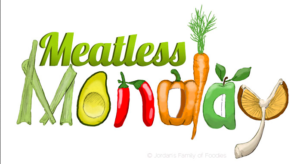The term is an advertising slogan to encourage people to cut out eating meat one day a week. The slogan uses Monday as an example presumably because of the alliteration with “Meatless,” and because it was used in the US during World War I to reduce consumption of a key staple in support of the war effort. There is also evidence suggesting that people are more readily inclined to adopt new behavior on Mondays since it is in effect the start of a fresh week, and follows a weekend when people tend to relax from restrictions.

In the last several decades it was resurrected as part of public health campaigns to reduce reliance on meat because of the risks of preventable illnesses associated with excessive meat consumption, including diabetes and heart diseases.
At the same time, it has become recognized that raising beef cows creates significant environmental problems including pollution of waterways with fertilizers, and substantial greenhouse gas (GHG) emissions of methane from flatulent cows and from converting woodlands to pasture.
Some further ideas to explore on Meatless Mondays:
How often do you eat meat? Every day? Every meal?
How often do you eat vegetables? Every day? Every meal?
If you eat meat at every meal or every day, what health risks are you subjecting yourself to?
What climate risks result from raising animals for their meat?
Sources:
Meatless Monday: History www.meatlessmonday.com/about-us/history/
Bobby Magill, “Studies Show Link Between Red Meat and Climate Change,” Climate Central (20 April 2016). bit.ly/2XEeXtP
Oliver Milman, “Why eating less meat is the best thing you can do for the planet in 2019,” The Guardian (21 Dec 2018). bit.ly/2T5nEv4
Mayo Clinic, Meatless meals: The benefits of eating less meat mayocl.in/2M3SwcB
National Institutes of Health, Risk in Red Meat? bit.ly/1Vbye25


No comments yet, add your own below